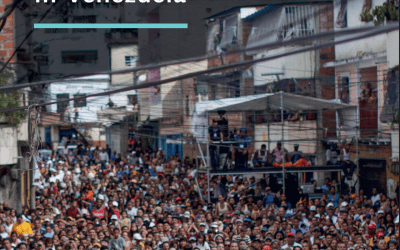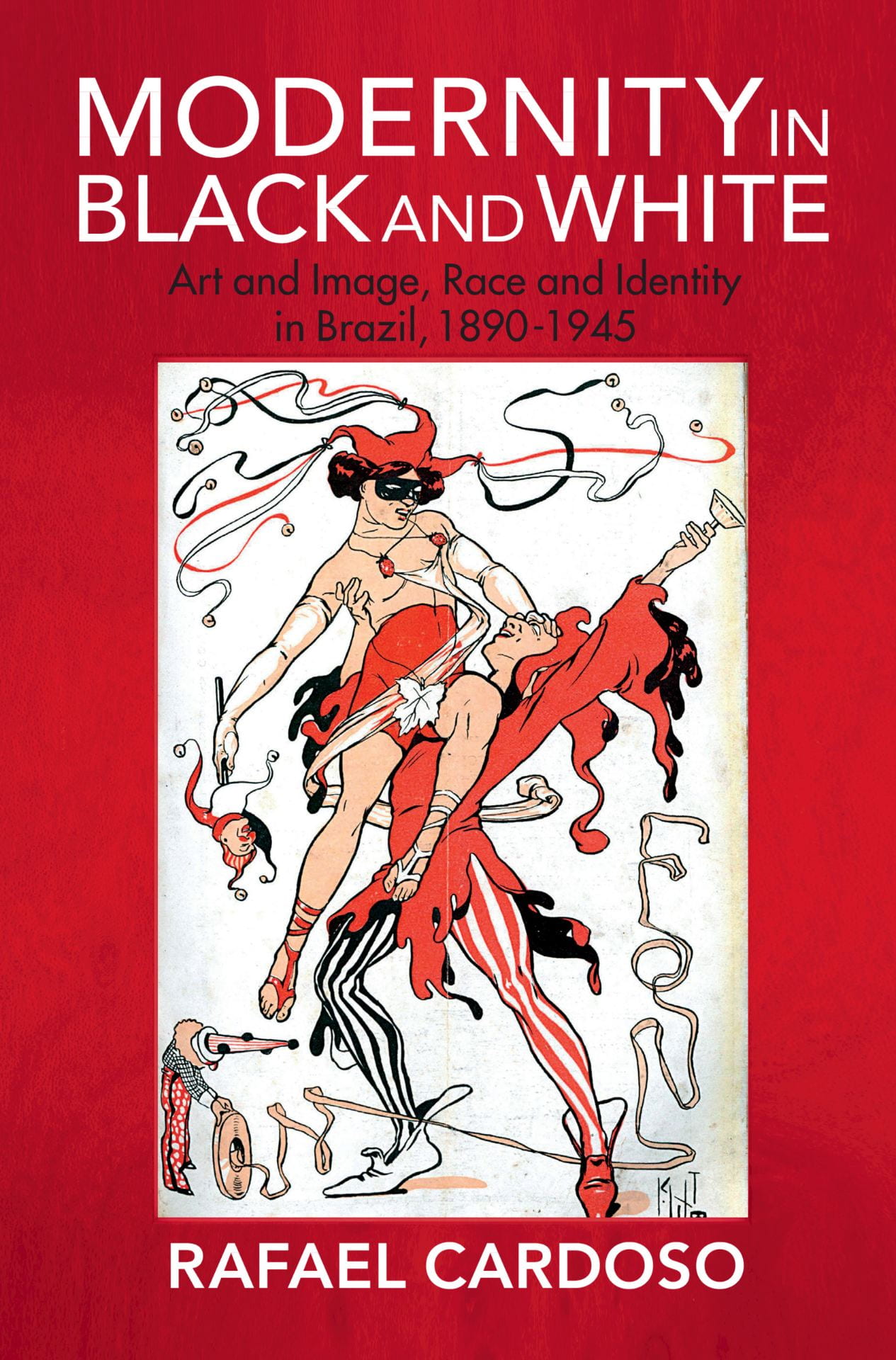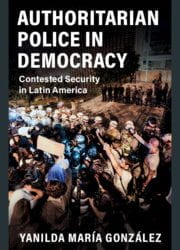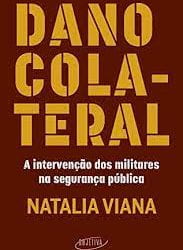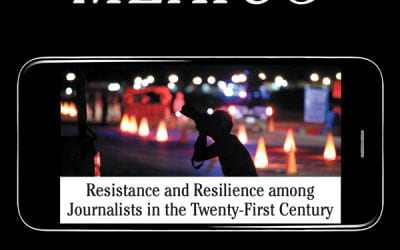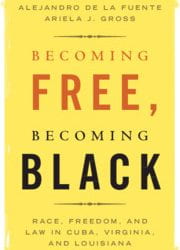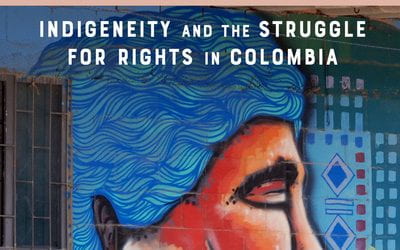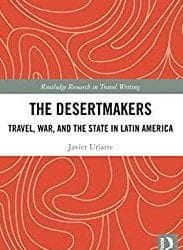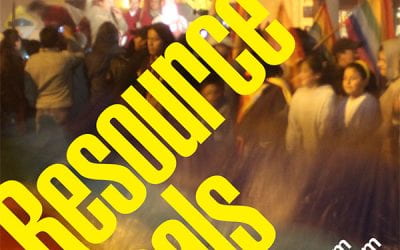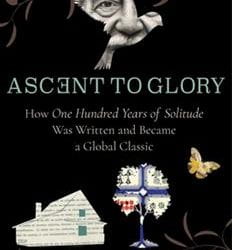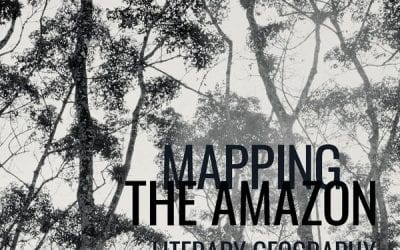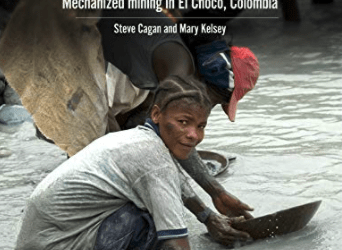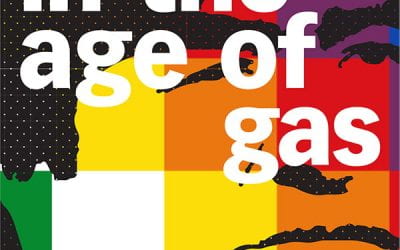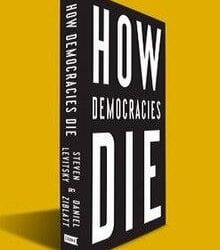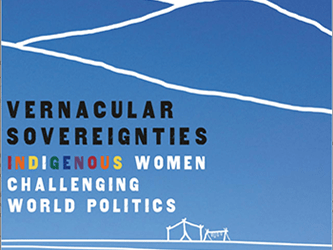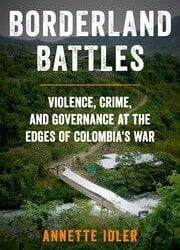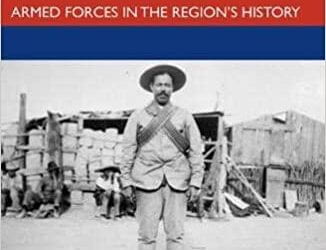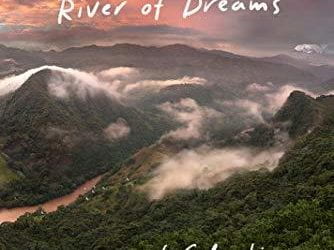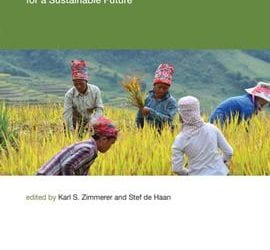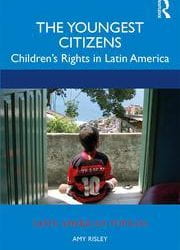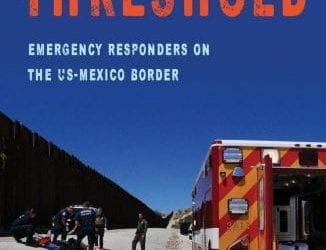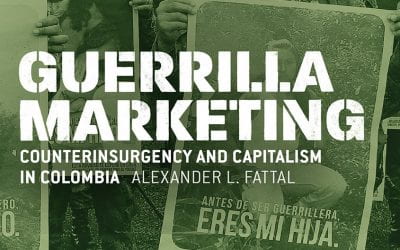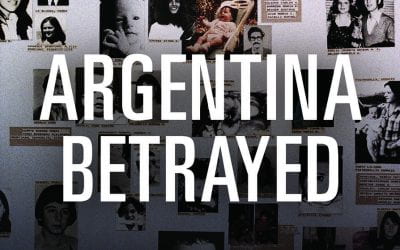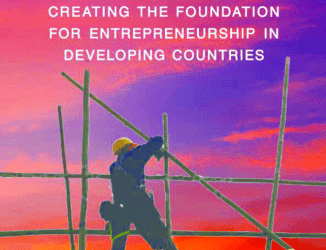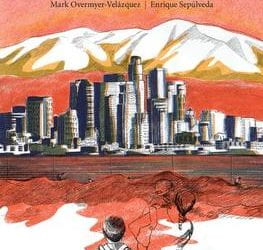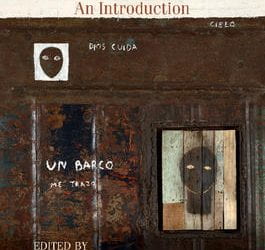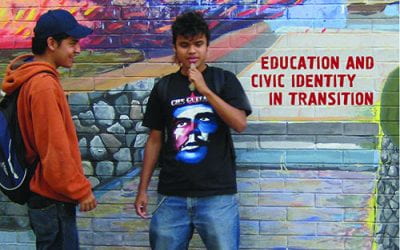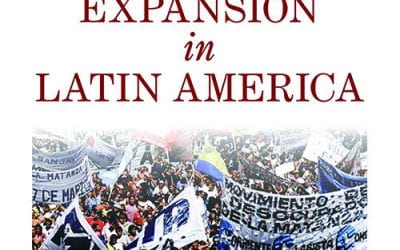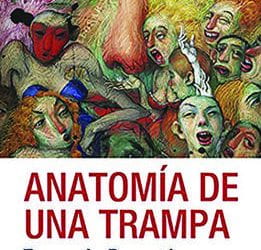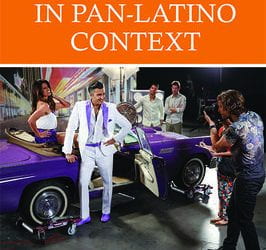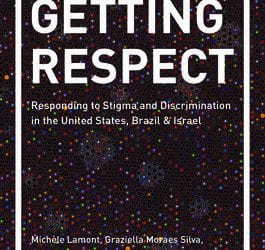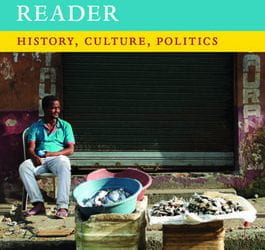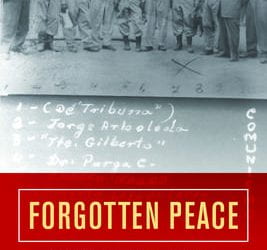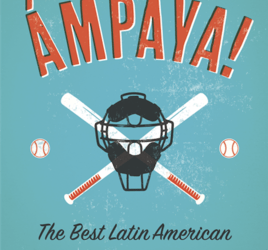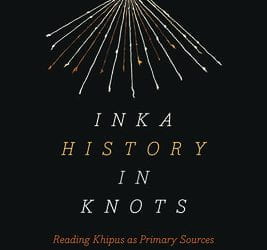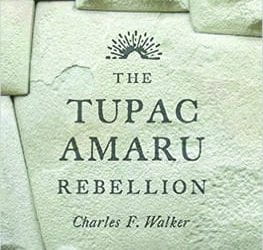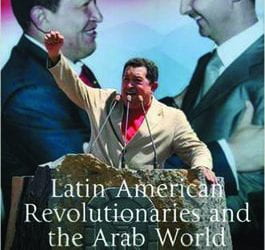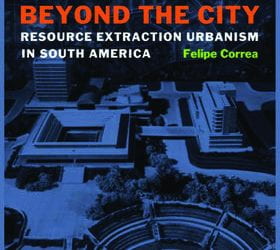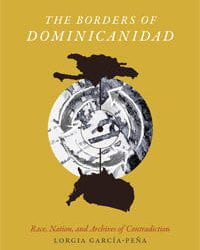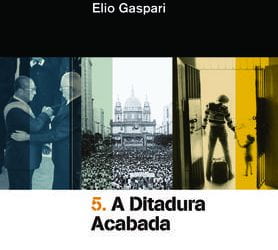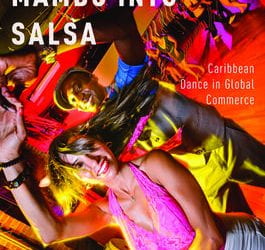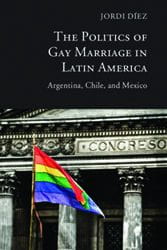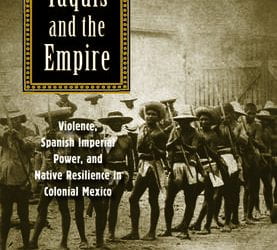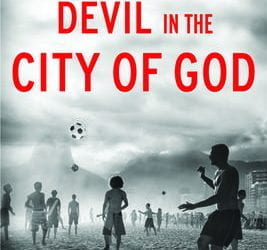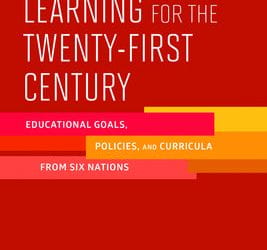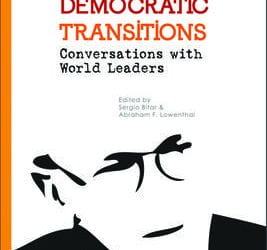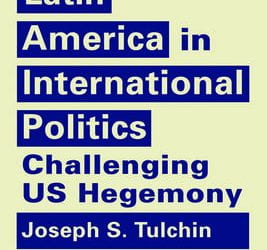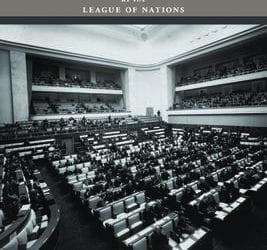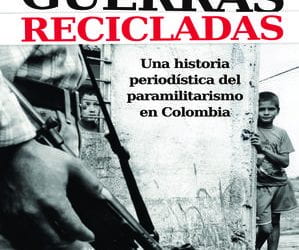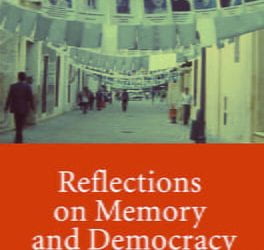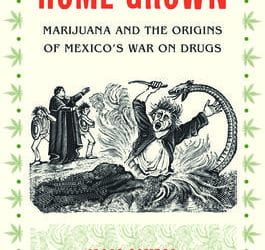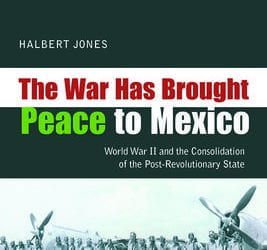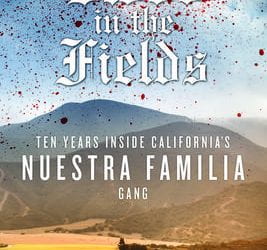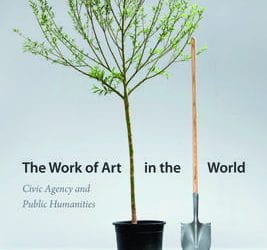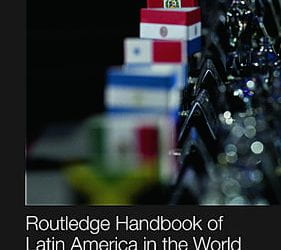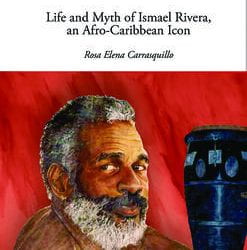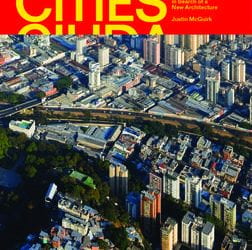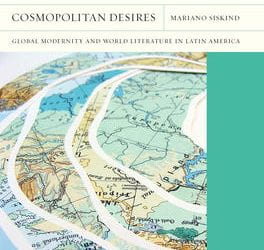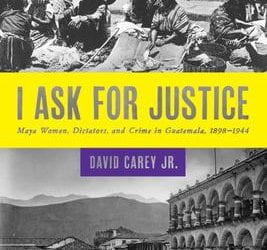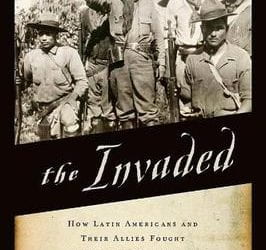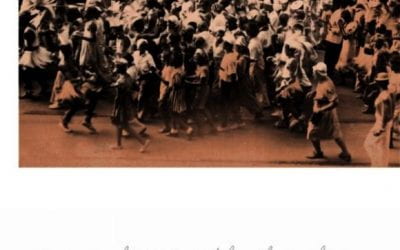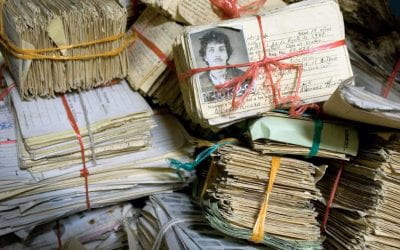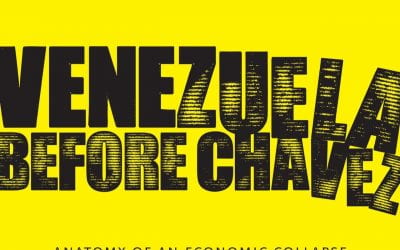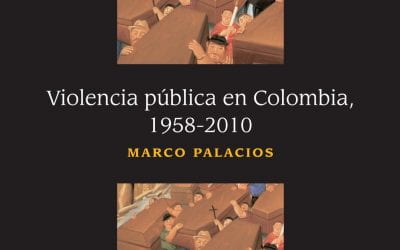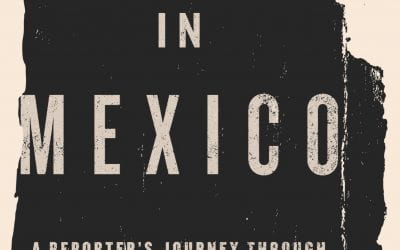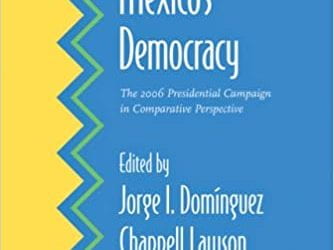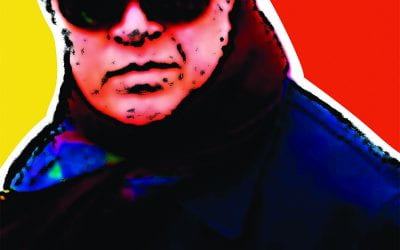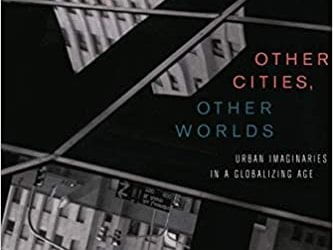The new ReVista book review section features reviews of recent books about Latin America, the Caribbean and the Latinx community in all disciplines.
Review of Sonorous Worlds: Musical Enchantment in Venezuela
Sonorous Worlds is anthropologist Yana Stainova’s memoir (not her term) of her experiences while researching music among marginalized communities in…
Modernity in Black and White
For years, one of my favorite pieces in the Museo de Arte Latinoamericano de Buenos Aires (MALBA) was the iconic Abaporu (1928), by Brazilian artist Tarsila do Amaral: a canvas…
La Güera Rodríguez
By now, history has added a layer to the many ironies that Brandeis historian Silvia Arrom highlights in her spirited book about a controversial historical figure. The recent irony is…
Authoritarian Police in Democracy
This deeply researched book suggests to its reader a truly tragic paradox: the possibility that under certain conditions, democratic institutions and processes may undermine rather than strengthen the rule of law. Building on grounded…
The Brazilian Military’s Role in Public Security
On Sunday April 7, 2019, a 46-year-old private security guard and musician by the name of Evaldo Rosa dos Santos was driving his wife Luciana, seven-year-old son Davi…
Surviving Mexico
Mexico is by far the most dangerous country for journalists to work in the Americas, and routinely hovers near the top of the world’s most dangerous, competing with countries like Iraq which are active war zones. Since 2000, 145 journalists have been killed in Mexico for…
Becoming Free, Becoming Black
The year was 1690. In the city of Havana, Cuba, a 20-year old enslaved woman named Juana asked the man who held her in slavery, one Juan Junco González, to grant her…
El misterio de las causalidades
Are the coincidences in our lives just random or could they have hidden causes and deeper meanings? Argentine author Maud Daverio Cox…
For Christ and Country
In the opening scene of Robert Weis’s superb For Christ and Country, Militant Catholic Youth in Post-Revolutionary Mexico…
Intimate Frontiers: A Literary Geography of the Amazon
Here is how I would translate the experience of reading this book into an image: an old chest, half-opened, slightly scary but quite inviting. As you opened it up, maps, travelogues, legal…
Wait for Me
Forty years ago, when traveling to visit family and friends in Europe from conflict zones of Central America, I was often asked: “So, how are things going over there?” But there was…
Indigenous Peoples, Active Agents
Recently, the Amazon and its indigenous residents have become hot issues, metaphorically as well as climatically. News stories around the world have documented raging and relatively…
Beyond the Sociology Books
If you are not from Colombia and hoping to understand the South American nation of 50 million souls, you might tend to focus on “Colombia the terrible”—narcotics and decades of socio-political violence…
Form and Feeling: The Making of Concretism in Brazil
In Form and Feeling: The Making of Concretism in Brazil, curator Antonio Sergio Bessa gathers together fourteen essays that provocatively reframe canonical practices of art and poetry
Spatial, Sonic and Sublime Remains of War
I read Javier Uriarte’s book over the course of a winter long both in metaphor and reality, during a pandemic that peaked in snowy New England in the early months of 2021. One might imagine
Social Movements and Government Actions in Ecuador
Resource Radicals provides ethnographic detail that contextualizes broad, and often confusing, social and political movements common in Latin America. The book focuses largely on
Ascent to Glory: How One Hundred Years of Solitude was Written and Became a Global Classic
When, at the age of seventeen, I heard that Gabriel García Márquez had won the Nobel Prize, I was surprised, not that he had won it, because I knew of him at the time as a writer of world
Poetry and History in 18th-century Brazil
In his presentation of the beautifully published volume, Obras Completas de Alvarenga Peixoto, historian Kenneth Maxwell turns our attention to one of his specialties, the late 18th-century
A Review of Mapping the Amazon
English + Español
In her book Mapping the Amazon: Literary Geography after the Rubber Boom, Amanda M. Smith renews the critical readings about the corpus canónico of the 20th-century novels about the…
The Price of Gold
English + Español
I loved to be in the Chocó. My work on a biodiversity conservation project allowed me to travel frequently to the seldom-visited northwest fringe of Colombia. The…
Bolivia in the Age of Gas
Bret Gustafson’s Bolivia in the Age of Gas is an ambitious and exquisitely detailed historical ethnography of Bolivia and its complicated relation with gas (and oil). Fossil fuels, Gustafson argues, have been central to the making of Bolivia, of this “gaseous state.” Drawing on a deep, decades-long engagement in the region…
El jardín pandémico
English + Español
Imagine the tranquility of a garden. With the aroma of flowers mixed in with the buzzing of bees and the contrast of shady trees against the fierce Paraguayan sun. From the intimacy of a family garden in which daily ritual leads one to water the plants, gather up the dry leaves…
How Democracies Die
How Democracies Die analyzes the main dangers that modern democracies face. As the authors warn, 21st-century democracies do not die in one fell swoop, in a violent way, by hands that do not always belong to the political system. On the contrary, modern democracies…
The Return of Collective Intelligence
My college Native American Culture professor, the Mescalero Apache scholar Inez Sánchez, told our class that we should regard the word “primitive” as synonymous with “complex.” I gained a better understanding of what Sánchez meant reading The Return of Collective…
Vernacular Sovereignties
English + Español
Manuela Lavinas Picq, a professor at the Universidad San Francisco en Quito, Ecuador, offers a rarely seen representation of Latin American Indigenous women as a collective, historical and political actor in search of justice and social transformation. Eurocentric, capitalist…
The Fernando Coronil Reader
English + Español
Fernando Coronil appears on the cover of this posthumous book in a photograph taken by his daughter Mariana. Cement and a communications tower appears to distance him from his beloved plains and grasslands. But no such distance exists. The hammock from…
Borderland Battles
When then-President Juan Manuel Santos signed a peace accord with one of the Western Hemisphere’s oldest guerrillas in 2016 (the Fuerzas Armadas Revolucionarias de Colombia – FARC), optimism ran high that an end to decades-long violence in Colombia had been…
Exile Music
Novels about the Holocaust and Jewish survival span countries and languages and audiences of all ages. Such stories tend to be told against a European or United States background. Rarely does a novel involve European Jewish refugees who found sanctuary in Latin…
Latin American Soldiers
John R. Bawden’s Latin American Soldiers: Armed Forces in the Region’s History introduces readers to the study of Latin American’s Armed Forces., Bawden examines warfare and military traditions in four different countries (Mexico, Cuba, Brazil and Chile)…
Magdalena: River of Dreams
Wade Davis, a Canada-born ethnobotanist, published a widely praised book in 1996 titled One River. It chronicled the explorations and discoveries of his Harvard professor, Richard Schultes, who sought to understand the origins of mind-altering plants and their ritualistic…
The Cubans
Reading the new book The Cubans: Ordinary Lives in Extraordinary Times made me nostalgic for my years on the island as a U.S. news correspondent. I certainly didn’t miss the struggles or hassles, of which there were plenty, but it made me long for the intelligent…
Ghosts of Sheridan Circle
Targeted killing of political enemies—assassinations—is thankfully rare in the United States. The most famous such assassination occurred in Washington, DC. And it was committed by a close ally of the United States. In September 1976, Chile’s Pinochet dictatorship…
Agrobiodiversity: Integrating Knowledge for a Sustainable Future
I initially approached the volume titled Integrating Knowledge for a Sustainable Future as an outside observer. As an archaeologist whose research focus is ancient agriculture, my expertise…
The Youngest Citizens: Children’s Rights in Latin America
The gap between theory and practice is not a promising place to start a book on children’s human rights. We already know that children’s legal entitlements on paper and on-the-ground…
Young Castro: The Making of a Revolutionary
Before he died on Nov. 25, 2016, Fidel Castro told his brother Raúl that he wanted no statues erected in his honor nor any streets, roads or squares named after him…
Regulating Style
At the Art Basel Cities exhibits in Buenos Aires a few months back, Mexican artist Pia Camil displayed her interactive artwork, “Gaby’s T-Shirt,” a striking ceiling-to-floor curtain made of 300…
Threshold: Emergency Responders on the US-Mexico Border
As a journalist who has reported on both sides of the U.S.-Mexico border, I found Ieva Jusionyte’s look at the role of emergency responders who defy official boundary lines to save lives not just…
Guerrilla Marketing: Counterinsurgency and Capitalism in Colombia
Colombia’s decades-long civil war has waxed and waned over the last fifty years. It has claimed the lives of 220,000 Colombians and displaced five million people from their homes. As the…
Argentina Betrayed: Memory, Mourning, and Accountability
In his new book, Argentina Betrayed: Memory, Mourning, and Accountability, the Dutch scholar Antonius C.G.M. Robben seeks to establish a conceptual thread that will lead us through decades…
Trust: Creating the Foundation for Entrepreneurship in Developing Countries
This book will deepen your understanding of how for-profit, nonprofit, or governmental entrepreneurship can be a powerful force for economic and social progress in developing countries…
Global Latin(o) Americanos: Transoceanic Diasporas and Regional Migrations
Global Latin(o) Americanos: Transoceanic Diasporas and Regional Migrations engages ongoing debates about mobility and migration from a unique “Latin(o)” perspective which integrates new interdisciplinary work on inter-Latin American migration and broader diaspora studies in a field often focused on the migration of Latin Americans to the United States.
Afro-Latin American Studies: An Introduction
In the ongoing process of exploring, making and re-making the modern world, some stake flags, others publish books—both being political constructions and assertions as part of larger institutional projects. Such is the case with Alejandro de la Fuente and George Reid Andrews’ edited volume Afro-Latin American Studies: An Introduction. With contributions from nearly two dozen historians, anthropologists, sociologists, ethnomusicologists and literary scholars…
Evidence for Hope: Making Human Rights Work in the 21st Century
A Review of Evidence for Hope: Making Human Rights Work in the 21st Century Contemporary Human Rights and Latin America On September 5, 1921, Roscoe “Fatty” Arbuckle, Hollywood’s then best-paid star, attended a party in San Francisco’s St. Francis Hotel, drank...
Youth in Postwar Guatemala: Education and Civic Identity in Transition
What happens when young people must simultaneously grapple with an uncertain future burdened with the legacy of conflict, violence, and impunity? Michelle Bellino provides some answers to a question that echoes throughout many conflict-affected areas, Guatemala in…
Social Policy Expansion in Latin America
The welfare state emerged in middle-income countries in Latin America during the first half of the 20th century when health care services and pensions were granted to workers with formal sector jobs…
Anatomía de una Trampa
English + Español
While campaigning, many politicians in Latin America use the rhetoric of dignity and rectitude to sway voters. However, in power, they often forget electoral promises, abusing…
Social Policies and Decentralization in Cuba
From my snapshot views of Cuba in ve visits over the years, two eye-opening moments stand out. In 1980, after visiting one workplace after another where union and management…
Telenovelas in Pan-Latino Context
When I was running a newspaper bureau in Nicaragua, I once went to look for my housekeeper to ask where we kept something or other. She wasn’t there, but her TV was on…
Getting Respect
When I first arrived in Brazil in the 1980s, I quickly learned that race in Brazil was not important there. The country that once had by far the largest slave population in the…
The Colombia Reader: History, Culture, Politics
Fifteen-plus years ago, historian David Bushnell argued in his widely read textbook that Colombia was the least studied and probably the least understood major country in Latin America…
Forgotten Peace: Reform, Violence and the Making of Contemporary Colombia
On June 30, 2017, a liaison officer with the United Nations peace keeping mission in Colombia wrote, from Arauca, about the prospects for long-term peace in that South American nation…
Kill the Ampaya! The Best Latin American Baseball Fiction
In December 1999, President Hugo Chávez took to the balcony of the Miraflores Palace in Caracas to announce that a nationwide referendum had overwhelmingly approved a new constitution that, among other things, transformed Venezuela into a Bolivarian…
Rebel Mother: My Childhood Chasing the Revolution
At various points in Peter Andreas’ extraordinary childhood, he was kidnapped by his own mother, lived as a squatter in a commune in Chile during the tumultuous months leading up to the coup d’état in 1973, and traveled throughout Peru performing revolutionary street…
Inka History in Knots
Some years ago I went to the South Tyrol Museum of Archaeology in Bolzano, in Italy’s Alto Adige, to gaze upon Ötzi. Better known as the Iceman, Ötzi was an early Bronze Age traveler and homicide victim whose well-preserved body was accidentally discovered in 1991 as it…
The Tupac Amaru Rebellion
On May 18, 1781, Spanish authorities in Cuzco executed José Gabriel Condorcanqui Noguera, also known as Tupac Amaru, in front of thousands of onlookers. Claiming to be the rightful…
Latin American Revolutionaries and the Arab World
The presence of an Arab diaspora in Latin America is reasonably well known. Step forward Shakira! But relations between Latin America and the Arab World have not been well covered in the…
Beyond the City: Resource Extraction Urbanism in South America
If I had to think of keywords for this intriguing book, they would be “passionate” and “meticulous,” with a third word bringing these two together: “design.” I agreed to review this…
Challenges of Party-Building in Latin America
I started graduate school in September 1978, around the zenith of authoritarianism in Latin America. After the Argentine military coup in 1976, only three of twenty countries in the…
The Borders of Dominicanidad: Race, Nation and the Archives of Contradiction
This book by Harvard Professor Lorgia Garcia-Peña embarks on an ambitious exploration of the limits of Dominican identity seen through the prism of culture, geography and race…
A Ditadura Acabada
The timing of the publication of the fifth and final volume of Elio Gaspari’s monumental history of the Brazilian military regime could not be more relevant. It is ironic that his new…
Spinning Mambo into Salsa: Caribbean Dance in Global Commerce
At a fancy yet packed bar in Tokyo’s most cosmopolitan district; at the patio of a bar in Vancouver facing the Canadian Rockies; at a hotel lounge bar overlooking the skyline of…
The Politics of Gay Marriage in Latin America
Despite its recent successes, the gay rights movement in Latin America is generally ignored in discussions of contemporary Latin American politics. Even students of Latin American social…
The Yaquis and the Empire
Winner of the 2015 Latin American Studies Association Social Science Book Award and runner-up for the 2015 David J. Weber-Clements Prize of the Western History Association, The Yaquis…
Beyond Bolaño: The Global Latin American Novel
I often wonder what life would have held for the late Chilean writer Roberto Bolaño if he had not passed away due to liver complications more than a decade ago. This year he would have…
Dancing with the Devil in the City of God
Juliana Barbassa and I have similar stories. We are both Brazilian with a chronic case of wanderlust, but in some ways on opposite tracks: Barbassa is from Rio and I am from São Paulo…
Teaching and Learning for the Twenty-First Century
In Teaching and Learning for the Twenty-First Century. Educational Goals, Policies and Curricula from Six Nations, Fernando Reimers and Connie K. Chung examine some policy issues in…
Volunteering for a Cause
What happens when researchers look quite simply for “other ways of telling the story?” Silvia Marina Arrom asks this question at the beginning of her deeply researched history of the male…
La danza hostil
La danza hostil revisits an age-old question in political science: how is political power constructed (and re-constructed)? Alberto Vergara tackles this question by examining…
Democratic Transitions: Conversations with World Leaders
The premise of this well-written and absorbing book is that political leaders matter decisively for democratic regime change. Sergio Bitar and Abe Lowenthal conducted face-to-face interviews…
Latin America in International Politics: Challenging US Hegemony
U.S. studies of the international relations of Latin American states and inter-American foreign policy have traditionally been viewed (stuck even) through the prism of U.S. hegemony, in…
Beyond Geopolitics: New Histories of Latin America at the League of Nations
The League of Nations (LN) was founded on January 10, 1920, at the initiative of President Woodrow Wilson who, at the Paris Peace Conference the year before, had put forth a…
Guerras recicladas: Una historia periodística del paramilitarismo en Colombia
Guerras Recicladas is not just “a journalistic history of paramilitarism in Colombia,” as the subtitle describes it. It is also a very insightful book, and a key to understanding our own country…
Reflections on Memory and Democracy
Memory is tricky business. So is democracy. Both are invariably challenged and contested from within and from without. The struggle against the manipulation of…
State Building in Latin America
Hillel Soifer’s powerful new book proposes a solid and original theory of state-building in Latin America. In recent years the study of how states formed and…
Home grown Marijuana and the Origins of Mexico’s War on Drugs
Marijuana is the talk of the town, as it has recently been discovered to be innocuous. Researchers have encountered little (if any) medical proof of severe…
The War
In November 1945, fighter pilots from Mexico’s Air Force Squadron 201 received a hero’s welcome upon returning home after their brief participation in World War…
Blood in the Fields
In 2003, when his son was arrested for killing a heroin dealer in Salinas, California, Armando “Big Mando” Frias did what any loving father would do…
The Work of Art in the World
When Doris Sommer briefed Harvard President Larry Summers in 2006 on her Cultural Agents Initiative (CAI) at Harvard, she expressed concern about the…
Routledge Handbook of Latin America and the World
On December 17, 2014, after U.S. President Barack Obama and Cuban President Raúl Castro simultaneously announced the decision to move towards…
The People’s Poet
The day Rafael Cortijo’s remains were put to rest in Puerto Rico in 1982, his admirers came out in full force to honor their tropical music hero one last time…
A Review of Child Migration & Human Rights in a Global Age
The two boys walked up the road to the top of a levee and then sat down in the gravel and weeds. In the near distance overhead, the Anzalduas Bridge spanned…
Radical Cities: Across Latin America in Search of New Architecture
Growing up in the midst of the Irvine Company’s unimaginative southern California, without exposure to anything other than strip malls and suburban…
Doña Lucía: La Biografía no Autorizada
The day Lucía Hiriart returned to her native Chile from Ecuador in 1959 was not a happy one. With five young children in tow, she and her husband Augusto…
Cosmopolitan Desires
In January 2015, shortly after terrorist attacks in Paris, the slogan “Je suis Charlie” began to circulate on Twitter and to appear on demonstrators’ signs in Paris and…
I Ask for Justice: Maya Women, Dictators, and Crime in Guatemala, 1898–1944
On May 10, 2013, General Efraín Ríos Montt sat before a packed courtroom in Guatemala City listening to a three-judge panel convict him of genocide and crimes against humanity. The conviction, which mandated an 80-year prison sentence for the octogenarian, followed five weeks of hearings that included testimony by more than 90 survivors from the Ixil region of the department of El Quiché, experts from a range of academic fields, and military officials.
The Aesthetics and Ethics of Faith: A Dialogue Between Liberationist and Pragmatic Thought
A young boy witnessing a reenactment of the Passion Story in San Antonio, Texas, screams at his mother as Roman soldiers “whip” Jesus: “Mommy, call the police, that’s wrong! They just can’t hit him like that!” The aesthetics of the Good Friday rituals at San Fernando Cathedral evoke empathy and a call for action.
The Invaded: How Latin Americans and Their Allies Fought and Ended U.S. Occupations
There was a time when U.S. naval officers were tasked with running entire countries. They did their best. In Nicaragua from 1912-1933, Haiti from 1915-1934 and the Dominican Republic from 1916-1924, contingents of Marines directly administered or determined who ruled
Porous City: A Cultural History of Rio de Janeiro
In her book Hegel, Haiti and Universal History, Susan Buck-Morss cautioned against the growing trend in the academy towards specialization. Specialization…
Paper Cadavers: The Archives of Dictatorship in Guatemala
In July 2005, Edeliberto Cifuentes, a noted historian at that time employed by the office of Guatemalan Human Rights Ombudsman (PDH) as a hands-on…
Venezuela Before Chavez: Anatomy of an Economic Collapse
In early 1999, in an event organized by the Inter-American Dialogue in Washington D.C., Venezuelan president Hugo Chávez addressed the U.S. policy…
Intimate Enemies: Violence and Reconciliation in Peru
A little more than twenty years ago, Andeanist anthropologists were taken to task for “missing the revolution.” At the time—the early 1990s—Peru was awash in…
Violencia pública en Colombia
Another book about violence in Colombia? At first glance, it would seem superfluous to add one more title to the already extensive bibliography that…
Midnight in Mexico: A Reporter’s Journey Through a Country’s Descent into Darkness
In Mexico, the tradition goes, your heart will always remain where your umbilical cord was buried. This place will always be your magnetic pole. Your safe-haven…
Debating U.S.-Cuban Relations: Shall We Play Ball
Here we go again—yet another moment in history when the U.S.-Cuban relationship, frozen (more or less) since early 1961, could be lurching toward sanity. What makes this moment…
Jobs for the Boys: The Politics of Public Sector Reform
Merilee Grindle begins her remarkable book with this lament from a 1913 edition of the Syracuse Herald. It’s a familiar refrain, especially to the international agencies pouring aid dollars into…
Pecado Original: Clarín, los Kirchner y la lucha por el poder
Graciela Mochkofsky is a young Argentine journalist who has worked for two major newspapers in her country, authored several books, and is presently co…
Lizards in an Evolutionary Tree
In the natural and social sciences, as in any other scholarly discipline, certain researchers become intimately associated with the study of particular topics. Think about Walter Álvarez and…
Consolidating Mexico’s Democracy
On Mexico’s presidential election night, July 2, 2006, I stood with reporters in a brightly lit room in the Federal Electoral Institute, the sprawling nerve center located in Mexico City’s outskirts. The…
All About Almodóvar: A Passion for Cinema
Pedro Almodóvar films, as any fan knows, are fastidiously designed and art-directed to the nth degree. They provide grist for mills aesthetic and ideological, emotional and intellectual, on…
Other Cities, Other Worlds
Author of a marvelous book that excavates the palimpsests of memories encrypted in the image-filled voids of Berlin, Andreas Huyssen extends his investigation of the urban imaginary in…

